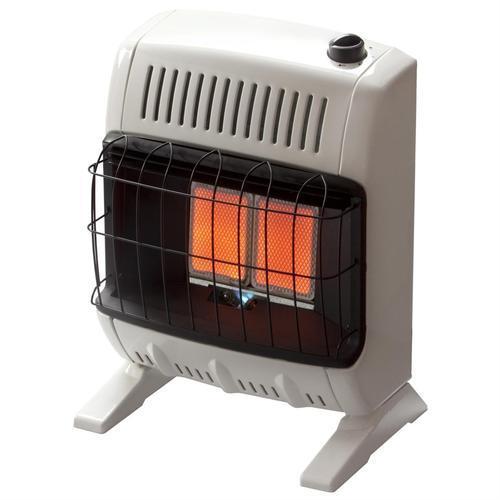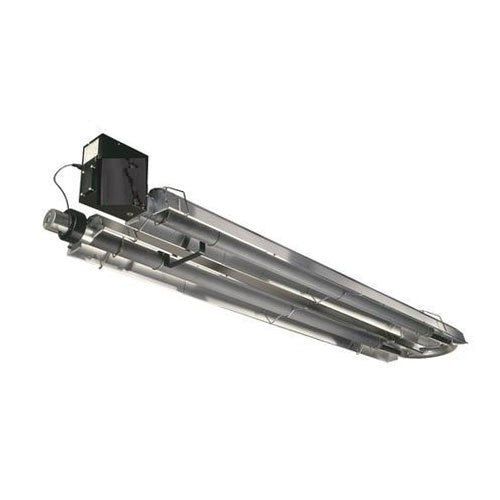Infrared Gas Heater
उत्पाद विवरण:
- मटेरियल
- वोल्टेज वोल्ट (v)
- पावर सोर्स Electric
- रंग White
- वारंटी Yes
- अधिक देखने के लिए क्लिक करें
X
मूल्य और मात्रा
- 1
उत्पाद की विशेषताएं
- Yes
- Electric
- वोल्ट (v)
- White
व्यापार सूचना
- दिन
उत्पाद वर्णन
Infrared Gas Heater is a special type of heating device that uses propane or natural gas to produce infrared radiation which is used to heat specific areas. This machine functions on direct heating by radiating infrared heat waves over specific areas. The high energy efficiency of this industrial heater makes it highly demanding among our customers. It also comes with safety features that help to prevent fuel leakage as well as ensure efficient power transfer.
Uses of Infrared Gas Heater:
1. Indoor Heating: Infrared gas heaters are often used for indoor space heating in residential, commercial, and industrial settings. They can be mounted on walls or ceilings, providing directed warmth to specific areas. Infrared heaters can quickly warm up spaces without relying on air circulation, making them suitable for areas where conventional heating systems might not be as effective.
2. Outdoor Heating: These heaters are commonly used for outdoor heating in spaces such as patios, decks, terraces, and outdoor seating areas at restaurants. Infrared heaters are effective in outdoor environments because they heat objects and people directly, rather than heating the surrounding air. This results in a more efficient use of energy and more comfortable heating, even in breezy conditions.
3. Warehouse and Industrial Heating: Infrared gas heaters are employed in warehouses, factories, and industrial facilities to provide localized heating to workers and equipment. They can effectively heat specific work areas, providing comfort and maintaining optimal working conditions in large open spaces.
4. Garages and Workshops: Infrared heaters are popular in garages and workshops where conventional heating methods might not be practical. They can warm up spaces quickly, allowing individuals to work comfortably in cooler environments.
5. Drying Processes: Infrared gas heaters are used in various drying applications, such as drying paint, curing coatings, and drying food products. The direct and intense heat generated by these heaters can expedite drying processes compared to conventional heating methods.
6. Livestock and Poultry Farms: Infrared heaters are employed in agricultural settings to provide warmth for livestock and poultry. These heaters can help maintain suitable temperatures for the animals, especially during colder months.
7. Medical and Therapy Applications: Infrared heaters are used in certain medical and therapy applications. For example, they are used in infrared saunas for relaxation and detoxification purposes. Infrared radiation is also used in some medical treatments for pain relief and wound healing.
8. Greenhouses: Infrared heaters can help regulate temperatures in greenhouses by providing direct heat to plants, soil, and other surfaces. This can aid in plant growth and protection during colder periods.
9. Sports Facilities: Some sports facilities, such as outdoor stadiums and arenas, use infrared gas heaters to keep spectators and athletes warm during events held in cooler weather.
10. Construction Sites: Infrared heaters can be used on construction sites to provide temporary heat for workers in areas where traditional heating systems might not be available.
Advantages of Infrared Gas Heater:
1. Efficient Heat Transfer: Infrared heaters emit radiant heat that travels directly in the form of electromagnetic waves, similar to the way the sun heats the Earth. This method of heat transfer eliminates the need to heat the surrounding air, resulting in more efficient energy use. Objects, surfaces, and people in the path of the infrared radiation absorb the heat directly, leading to quicker warming times.
2. Instant Heat: Infrared gas heaters provide instant heat as soon as they are turned on. Unlike traditional heating systems that require time to warm up the air, infrared heaters deliver heat almost instantly, making them ideal for spaces that need rapid warming.
3. Focused Heating: Infrared heaters emit a focused beam of heat, allowing you to direct warmth precisely where it's needed. This makes them ideal for spot heating in specific areas, which can be more energy-efficient than heating an entire space.
4. Comfortable Heat: The heat produced by infrared gas heaters is often described as more comfortable than the heat generated by convection heaters. This is because infrared radiation heats objects and surfaces, including your body, creating a feeling of warmth similar to being in sunlight.
5. No Air Circulation Required: Traditional forced-air heating systems rely on moving air to distribute heat, which can lead to uneven temperatures and discomfort due to drafts. Infrared heaters don't require air circulation, reducing the risk of spreading dust, allergens, or contaminants around the space.
6. Suitable for Outdoor Use: Infrared gas heaters are commonly used for outdoor heating in spaces like patios, terraces, and outdoor dining areas. They are effective in outdoor environments where air movement can diminish the effectiveness of other heating methods.
7. Lower Energy Consumption: Because infrared heaters target specific areas and objects, they can be more energy-efficient than heating an entire space. This targeted heating approach can lead to energy savings, especially in larger areas where zoned heating is desirable.
8. Low Maintenance: Infrared gas heaters typically have fewer moving parts than some other heating systems. This can result in lower maintenance requirements and reduced chances of mechanical breakdowns.
9. Silent Operation: Infrared gas heaters operate quietly since they don't rely on fans or blowers to distribute heat. This can be advantageous in spaces where noise reduction is important.
10. Environmentally Friendly: Infrared gas heaters can be more environmentally friendly than some other heating systems, especially if they are powered by natural gas or propane, which are cleaner-burning fuels compared to coal or oil.
11. Flexible Installation: Infrared heaters come in various shapes and sizes, allowing for versatile installation options. They can be wall-mounted, ceiling-mounted, or placed on portable stands, making them adaptable to different spaces.
FAQ:
1. What is an infrared gas heater?
Ans: An infrared gas heater is a device that uses natural gas or propane to generate heat through the emission of infrared radiation. This radiation directly heats objects, surfaces, and people in its path, similar to the way the sun heats the Earth.
2. How does an infrared gas heater work?
Ans: Infrared gas heaters emit infrared radiation that travels in straight lines, heating objects and surfaces it comes into contact with. Unlike traditional heaters that heat the air, infrared heaters heat objects, creating a more comfortable and efficient heating process.
3. What are the advantages of using an infrared gas heater?
Ans: Advantages include efficient heat transfer, instant warmth, focused heating, comfortable heat, no air circulation required, suitability for outdoor use, lower energy consumption, low maintenance, silent operation, and flexible installation options.
4. Are infrared gas heaters safe?
Ans: When installed and used correctly, infrared gas heaters are generally safe. However, proper ventilation, clearances from combustible materials, and compliance with manufacturer instructions are essential for safety.
5. Can infrared gas heaters be used indoors?
Ans: Yes, infrared gas heaters can be used indoors. They are commonly used for indoor heating in residential, commercial, and industrial spaces. However, proper ventilation and safety measures should be followed to prevent gas buildup and ensure safe operation.
6. How do I install an infrared gas heater?
Ans: Installation requirements vary depending on the model and type of infrared gas heater. It's recommended to follow the manufacturer's installation instructions carefully, ensuring proper clearances, ventilation, and fuel connections. If unsure, it's advisable to consult a professional for installation.
7. Do infrared gas heaters require maintenance?
Ans: Infrared gas heaters generally have fewer moving parts than some other heating systems, which can result in lower maintenance needs. However, regular cleaning and inspection of the burner, reflectors, and gas connections are still recommended to ensure safe and efficient operation.
8. Can infrared gas heaters be used outdoors?
Ans: Yes, infrared gas heaters are often used for outdoor heating, such as on patios, terraces, and outdoor seating areas. They are effective in outdoor environments where air circulation can reduce the effectiveness of other heating methods.
9. Are there different types of infrared gas heaters?
Ans: Yes, there are different types of infrared gas heaters, including wall-mounted, ceiling-mounted, and portable models. Some use ceramic elements, while others use radiant tubes to emit infrared radiation.
10. Are infrared gas heaters energy-efficient?
Ans: Yes, infrared gas heaters can be energy-efficient due to their targeted heating approach. They focus heat on specific areas or objects, which can lead to energy savings compared to heating the entire space.
11. Can I control the temperature of an infrared gas heater?
Ans: Many modern infrared gas heaters come with temperature control features that allow you to adjust the heat output. This can help you maintain a comfortable temperature in your desired area.
क्रय आवश्यकता विवरण दर्ज करें



